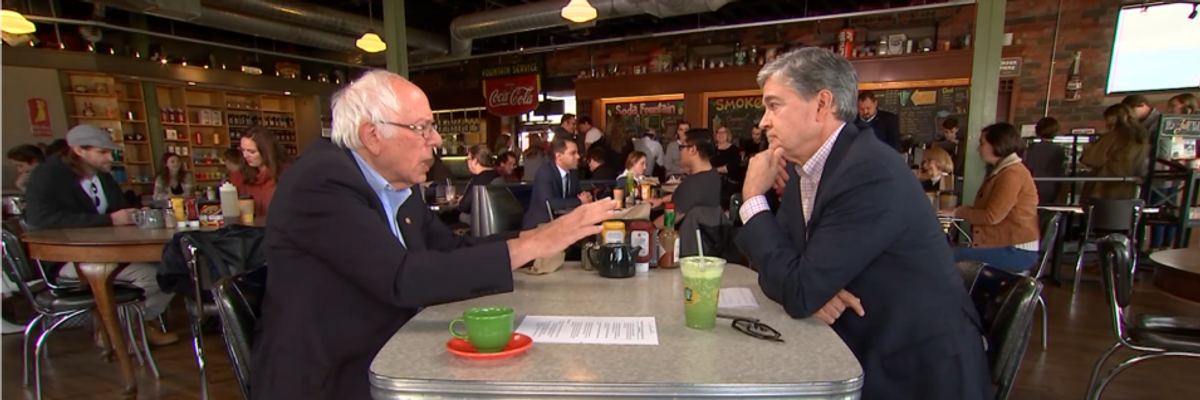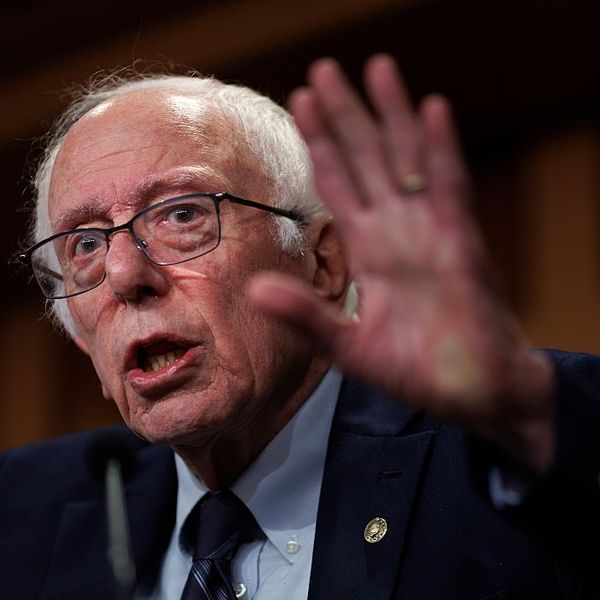
CNBC on Tuesday released editor at large John Harwood's new interview with Sen. Bernie Sanders (I-Vt.), a candidate in the 2020 Democratic presidential primary race . (Photo: CNBC/screenshot)
Vowing to Put People Before Corporate Interests, Sanders Agrees He Poses 'Existential Threat to the Democratic Party'
"I want to convert the Democratic Party, to break its dependency on big money and corporate interests, and make it a party of working-class people, of young people, of all people who believe in justice."
White House hopeful Sen. Bernie Sanders on Tuesday agreed with centrist group Third Way that he poses an "existential threat" to the Democratic Party and called for transforming it to serve working-class people in a wide-ranging interview with CNBC's John Harwood.
After Sanders, a democratic socialist, said that "what I am trying to do, in many ways, is pick up where Franklin Delano Roosevelt left off," Harwood asked, "Do you also embrace the part of FDR that said adversaries hate me and I welcome their hatred?"
"Absolutely," the senator responded. "You can judge a person by the friends they have. You can judge a candidate for president by the enemies they have."
Sanders caucuses with Senate Democrats--and is seeking the party's 2020 presidential nomination--but has represented Vermont as an Independent in Congress since his first term in the House in 1991. In the interview, he added:
There was a guy who was head of Third Way, the corporate wing of the Democratic Party. He said, "Bernie Sanders is an existential threat to the Democratic Party." I agree with him. I am. I want to convert the Democratic Party, to break its dependency on big money and corporate interests, and make it a party of working-class people, of young people, of all people who believe in justice.
Watch:
Sanders' comment to CNBC came in response to remarks from Jon Cowan, president of the centrist think tank Third Way, published by The Guardian in June. At a gathering of a couple hundred "moderates" in South Carolina, Cowan reportedly said, "I don't believe a self-described democratic socialist can win" the White House.
Cowan told The Guardian that Sanders "has made it his mission to either get the nomination or to remake the party in his image as a democratic socialist" and "that is an existential threat to the future of the Democratic Party for the next generation."
Sanders and his surrogates have embraced Cowan's description. The senator tweeted on July 10 that "the Wall Street-funded Third Way thinks we are an existential threat--and they're right. We are an existential threat to the corporatism and greed that keeps their donors in power."
The next day, Sanders campaign senior adviser and speechwriter David Sirota told The Hill, "Bernie Sanders is an existential threat to that faction of the Democratic Party."
"Bernie Sanders is an existential threat to Wall Street continuing to rip off Americans as a business model--a business model of fraud," Sirota said.
On social media, progressives and journalists applauded Sanders for his interview performance on CNBC:
\u201cVery impressive interview with @BernieSanders https://t.co/1jg9y4wEjz\u201d— Matt Stoller (@Matt Stoller) 1572358118
\u201cCorrect take https://t.co/rMyQS82lEZ\u201d— Ryan Grim (@Ryan Grim) 1572359081
\u201cThis Sanders quote to @JohnJHarwood exemplifies his approach to Warren: Even if a negative attack is teed up for him he will make a quick contrast and move on. https://t.co/CbdZXNja7C\u201d— David Weigel (@David Weigel) 1572354979
In the interview, Sanders discussed some of his proposed reforms for Wall Street. He also called fossil fuel executives "criminals," reiterated his "demand that every American has healthcare as a human right," and stood by his recent statement distinguishing himself from fellow White House hopeful Sen. Elizabeth Warren (D-Mass.) by noting that she has said, "I am a capitalist to my bones."
An Urgent Message From Our Co-Founder
Dear Common Dreams reader, The U.S. is on a fast track to authoritarianism like nothing I've ever seen. Meanwhile, corporate news outlets are utterly capitulating to Trump, twisting their coverage to avoid drawing his ire while lining up to stuff cash in his pockets. That's why I believe that Common Dreams is doing the best and most consequential reporting that we've ever done. Our small but mighty team is a progressive reporting powerhouse, covering the news every day that the corporate media never will. Our mission has always been simple: To inform. To inspire. And to ignite change for the common good. Now here's the key piece that I want all our readers to understand: None of this would be possible without your financial support. That's not just some fundraising cliche. It's the absolute and literal truth. We don't accept corporate advertising and never will. We don't have a paywall because we don't think people should be blocked from critical news based on their ability to pay. Everything we do is funded by the donations of readers like you. Will you donate now to help power the nonprofit, independent reporting of Common Dreams? Thank you for being a vital member of our community. Together, we can keep independent journalism alive when it’s needed most. - Craig Brown, Co-founder |
White House hopeful Sen. Bernie Sanders on Tuesday agreed with centrist group Third Way that he poses an "existential threat" to the Democratic Party and called for transforming it to serve working-class people in a wide-ranging interview with CNBC's John Harwood.
After Sanders, a democratic socialist, said that "what I am trying to do, in many ways, is pick up where Franklin Delano Roosevelt left off," Harwood asked, "Do you also embrace the part of FDR that said adversaries hate me and I welcome their hatred?"
"Absolutely," the senator responded. "You can judge a person by the friends they have. You can judge a candidate for president by the enemies they have."
Sanders caucuses with Senate Democrats--and is seeking the party's 2020 presidential nomination--but has represented Vermont as an Independent in Congress since his first term in the House in 1991. In the interview, he added:
There was a guy who was head of Third Way, the corporate wing of the Democratic Party. He said, "Bernie Sanders is an existential threat to the Democratic Party." I agree with him. I am. I want to convert the Democratic Party, to break its dependency on big money and corporate interests, and make it a party of working-class people, of young people, of all people who believe in justice.
Watch:
Sanders' comment to CNBC came in response to remarks from Jon Cowan, president of the centrist think tank Third Way, published by The Guardian in June. At a gathering of a couple hundred "moderates" in South Carolina, Cowan reportedly said, "I don't believe a self-described democratic socialist can win" the White House.
Cowan told The Guardian that Sanders "has made it his mission to either get the nomination or to remake the party in his image as a democratic socialist" and "that is an existential threat to the future of the Democratic Party for the next generation."
Sanders and his surrogates have embraced Cowan's description. The senator tweeted on July 10 that "the Wall Street-funded Third Way thinks we are an existential threat--and they're right. We are an existential threat to the corporatism and greed that keeps their donors in power."
The next day, Sanders campaign senior adviser and speechwriter David Sirota told The Hill, "Bernie Sanders is an existential threat to that faction of the Democratic Party."
"Bernie Sanders is an existential threat to Wall Street continuing to rip off Americans as a business model--a business model of fraud," Sirota said.
On social media, progressives and journalists applauded Sanders for his interview performance on CNBC:
\u201cVery impressive interview with @BernieSanders https://t.co/1jg9y4wEjz\u201d— Matt Stoller (@Matt Stoller) 1572358118
\u201cCorrect take https://t.co/rMyQS82lEZ\u201d— Ryan Grim (@Ryan Grim) 1572359081
\u201cThis Sanders quote to @JohnJHarwood exemplifies his approach to Warren: Even if a negative attack is teed up for him he will make a quick contrast and move on. https://t.co/CbdZXNja7C\u201d— David Weigel (@David Weigel) 1572354979
In the interview, Sanders discussed some of his proposed reforms for Wall Street. He also called fossil fuel executives "criminals," reiterated his "demand that every American has healthcare as a human right," and stood by his recent statement distinguishing himself from fellow White House hopeful Sen. Elizabeth Warren (D-Mass.) by noting that she has said, "I am a capitalist to my bones."
White House hopeful Sen. Bernie Sanders on Tuesday agreed with centrist group Third Way that he poses an "existential threat" to the Democratic Party and called for transforming it to serve working-class people in a wide-ranging interview with CNBC's John Harwood.
After Sanders, a democratic socialist, said that "what I am trying to do, in many ways, is pick up where Franklin Delano Roosevelt left off," Harwood asked, "Do you also embrace the part of FDR that said adversaries hate me and I welcome their hatred?"
"Absolutely," the senator responded. "You can judge a person by the friends they have. You can judge a candidate for president by the enemies they have."
Sanders caucuses with Senate Democrats--and is seeking the party's 2020 presidential nomination--but has represented Vermont as an Independent in Congress since his first term in the House in 1991. In the interview, he added:
There was a guy who was head of Third Way, the corporate wing of the Democratic Party. He said, "Bernie Sanders is an existential threat to the Democratic Party." I agree with him. I am. I want to convert the Democratic Party, to break its dependency on big money and corporate interests, and make it a party of working-class people, of young people, of all people who believe in justice.
Watch:
Sanders' comment to CNBC came in response to remarks from Jon Cowan, president of the centrist think tank Third Way, published by The Guardian in June. At a gathering of a couple hundred "moderates" in South Carolina, Cowan reportedly said, "I don't believe a self-described democratic socialist can win" the White House.
Cowan told The Guardian that Sanders "has made it his mission to either get the nomination or to remake the party in his image as a democratic socialist" and "that is an existential threat to the future of the Democratic Party for the next generation."
Sanders and his surrogates have embraced Cowan's description. The senator tweeted on July 10 that "the Wall Street-funded Third Way thinks we are an existential threat--and they're right. We are an existential threat to the corporatism and greed that keeps their donors in power."
The next day, Sanders campaign senior adviser and speechwriter David Sirota told The Hill, "Bernie Sanders is an existential threat to that faction of the Democratic Party."
"Bernie Sanders is an existential threat to Wall Street continuing to rip off Americans as a business model--a business model of fraud," Sirota said.
On social media, progressives and journalists applauded Sanders for his interview performance on CNBC:
\u201cVery impressive interview with @BernieSanders https://t.co/1jg9y4wEjz\u201d— Matt Stoller (@Matt Stoller) 1572358118
\u201cCorrect take https://t.co/rMyQS82lEZ\u201d— Ryan Grim (@Ryan Grim) 1572359081
\u201cThis Sanders quote to @JohnJHarwood exemplifies his approach to Warren: Even if a negative attack is teed up for him he will make a quick contrast and move on. https://t.co/CbdZXNja7C\u201d— David Weigel (@David Weigel) 1572354979
In the interview, Sanders discussed some of his proposed reforms for Wall Street. He also called fossil fuel executives "criminals," reiterated his "demand that every American has healthcare as a human right," and stood by his recent statement distinguishing himself from fellow White House hopeful Sen. Elizabeth Warren (D-Mass.) by noting that she has said, "I am a capitalist to my bones."

